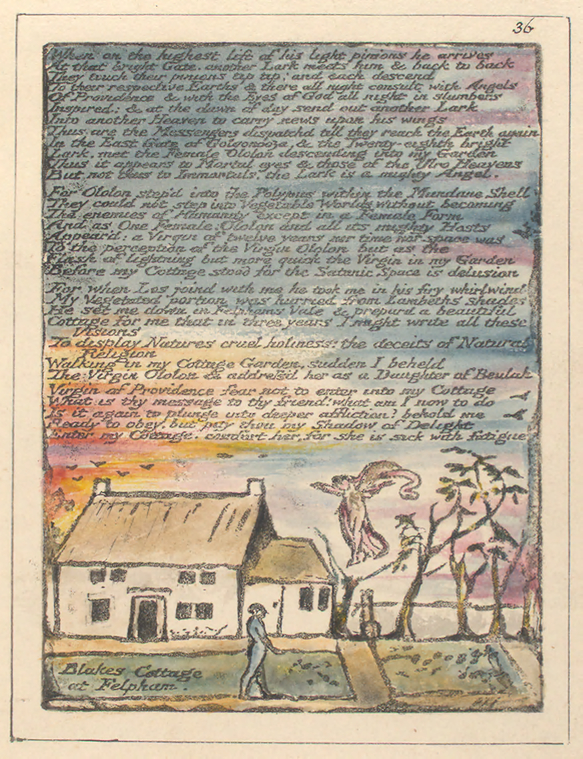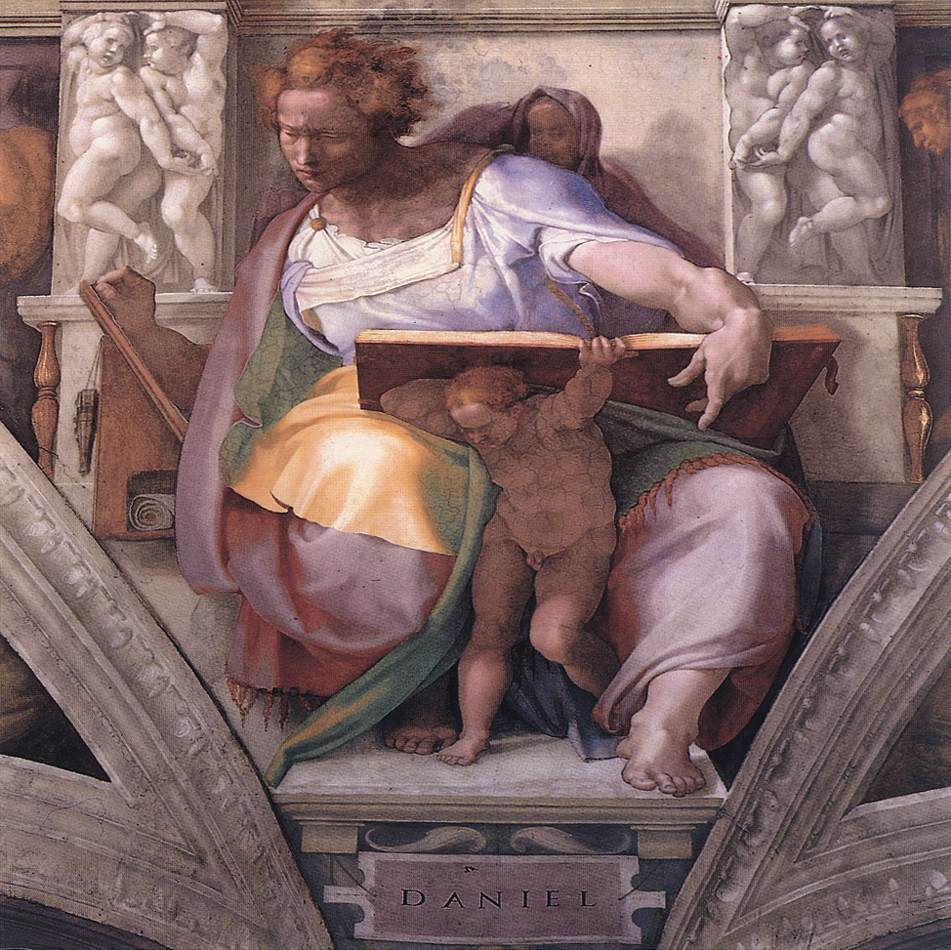First posted May 2010.
In ca 1920 S. Foster Damon came forth with
William Blake: His Philosophy and Symbols, a rare book nowadays. On Page 316 he stated that Plate 2 of
The Marriage of Heaven and Hell was written in light of Isaiah 35. It
echoes the 35th chapter of Isaiah. The "way of holiness" is what Blake called the perilous path.
Here's Plate 2 of MHH.
 " THE MARRIAGE of HEAVEN and HELL
PLATE 2
The Argument.
Rintrah roars & shakes his fires in the burdend air;
Hungry clouds swag on the deep
Once meek, and in a perilous path,
The just man kept his course along
The vale of death.
Roses are planted where thorns grow.
And on the barren heath
Sing the honey bees.
Then the perilous path was planted:
And a river, and a spring
On every cliff and tomb;
And on the bleached bones
Red clay brought forth.
Till the villain left the paths of ease,
To walk in perilous paths, and drive
The just man into barren climes.
Now the sneaking serpent walks
In mild humility.
And the just man rages in the wilds
Where lions roam.
Rintrah roars & shakes his fires in the burdend air;
Hungry clouds swag on the deep."
" THE MARRIAGE of HEAVEN and HELL
PLATE 2
The Argument.
Rintrah roars & shakes his fires in the burdend air;
Hungry clouds swag on the deep
Once meek, and in a perilous path,
The just man kept his course along
The vale of death.
Roses are planted where thorns grow.
And on the barren heath
Sing the honey bees.
Then the perilous path was planted:
And a river, and a spring
On every cliff and tomb;
And on the bleached bones
Red clay brought forth.
Till the villain left the paths of ease,
To walk in perilous paths, and drive
The just man into barren climes.
Now the sneaking serpent walks
In mild humility.
And the just man rages in the wilds
Where lions roam.
Rintrah roars & shakes his fires in the burdend air;
Hungry clouds swag on the deep."
(E 33)
This gave me a sudden enlightenment when I realized that Blake here was giving a critique of Isaiah 35 and following chapters. Immediately after the "way of holiness" Isaiah gives the ominous warning of Sennacherib, leading to King Hezekiah's famous verse: "not in my time, Lord."
Isaiah 35
[
1] The wilderness and the solitary place shall be glad for
them; and the desert shall rejoice, and blossom as the rose.
[
2] It shall blossom abundantly, and rejoice even with joy
and singing: the glory of Lebanon shall be given unto it, the
excellency of Carmel and Sharon, they shall see the glory of the
LORD, and the excellency of our God.
[
3] Strengthen ye the weak hands, and confirm the feeble
knees.
[
4] Say to them that are of a fearful heart, Be strong, fear
not: behold, your God will come with vengeance, even God with a
recompence; he will come and save you.
[
5] Then the eyes of the blind shall be opened, and the ears
of the deaf shall be unstopped.
[
6] Then shall the lame man leap as an hart, and the tongue
of the dumb sing: for in the wilderness shall waters break out, and
streams in the desert.
[
7] And the parched ground shall become a pool, and the
thirsty land springs of water: in the habitation of dragons, where
each lay, shall be grass with reeds and rushes.
[
8] And an highway shall be there, and a way, and
it
shall be called The way of holiness; the unclean shall not
pass over it; but it shall be for those: the wayfaring men, though
fools, shall not err therein.
[
9] No lion shall be there, nor any ravenous beast shall go
up thereon, it shall not be found there; but the redeemed shall walk
there:
[
10] And the ransomed of the LORD shall return, and come to
Zion with songs and everlasting joy upon their heads: they shall
obtain joy and gladness, and sorrow and sighing shall flee away.
Isaiah 37
[
31] And the remnant that is escaped of the house of Judah
shall again take root downward, and bear fruit upward:
[
32] For
out of Jerusalem shall go forth a remnant, and they
that escape out of mount Zion: the zeal of the LORD of hosts shall
do this.
[
33] Therefore thus saith the LORD concerning the king of
Assyria, He shall not come into this city, nor shoot an arrow there
nor come before it with shields, nor cast a bank against it.
[
34] By the way that he came, by the same shall he return,
and shall not come into this city, saith the LORD.
[
35] For
I will defend this city to save it for mine own
sake, and for my servant David's sake.
[
36] Then the angel of the LORD went forth, and smote in the
camp of the Assyrians a hundred and fourscore and five thousand: and
when they arose early in the morning, behold, they were all dead
corpses.
[
37] So Sennacherib king of Assyria departed, and went and
returned, and dwelt at Nineveh.
[
38] And it came to pass, as he was worshipping in the house
of Nisroch his god, that Adrammelech and Sharezer his sons smote him
with the sword; and they escaped into the land of Armenia: and
Esar-haddon his son reigned in his stead.
In MHH Blake is commenting on not just chapter 35, but Sennacherib, Hezekiah, etc. The perilous path, beautified by the just man, has been corrupted by the greedy, driving the just man back into the wilderness. That was Blake's take of this part of Isaiah, and a pretty good take on Blake's day and our day as well.
Of course if you've read The Marriage of Heaven and Hell, you recall that Blake reported a vision in which he dined with and interviewed Isaiah and Ezekiel. Go to plates 12 and 13.
.
.











